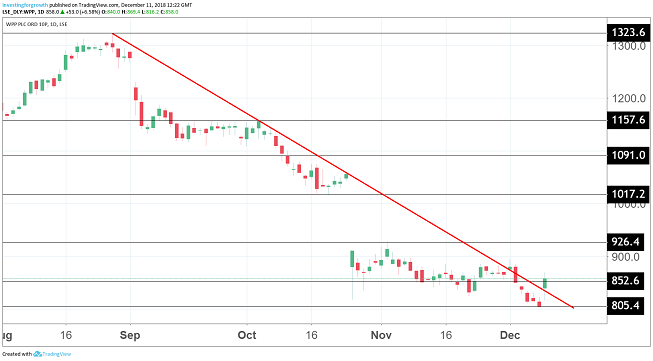Lock in 7% yield after WPP's dividend pledge
11th December 2018 12:42
by Graeme Evans from interactive investor
WPP chiefs have finally made public their new strategy document, and the City welcomes the idea of 'radical evolution' and a dividend promise, writes Graeme Evans.

Too unwieldy and not as fleet of foot as it needs to be, WPP has set out ambitious plans to reverse a two-year share price slump and convince investors that its problems are not evidence of an industry in structural decline.
The advertising giant's new strategy certainly got off on the right foot today, with key messages from chief executive Mark Read, including a pledge to maintain the FTSE 100 group's full-year dividend at the current 60p a share.
That's significant for a stock now trading with a dividend yield of 7% after its shares dived to their lowest level in six years at just above 800p. From a price/earnings multiple of 20x not so long ago, WPP is now on barely 5.5x.
Shares rose 7% today, with brokers including Morgan Stanley expressing relief that WPP also disclosed that recent trading has been slightly better than previously reported in a third quarter profits warning.
Prior to meeting management today, Morgan Stanley and Goldman Sachs were both neutral on the shares, with price targets of 1,000p and 1,038p respectively.

Source: TradingView (*) Past performance is not a guide to future performance
Despite the positive reception to Read's vision, there's still a long way to go before WPP can recover the crown it lost earlier this year to US rival Omnicom as the world’s biggest listed ad firm.
To do so, Read is planning a "radical evolution" where WPP increases investment in creativity, technology and talent.
Read said:
"What we hear from clients is very consistent: they want our creativity, and they want us to help them transform their business in a world reshaped by technology. This is at the heart of what we do."
This more contemporary proposition has already helped the company to win new business, including Volkswagen's creative account in North America. But the company will have to do much more if it is to compete in a digital advertising landscape now driven by the likes of Google and Facebook.
Part of the plan will be for WPP to expand its growing omni-channel commerce business to help brands succeed in marketplaces such as Alibaba and Amazon.
WPP said:
"We believe the industry is facing structural change not structural decline. WPP is adapting at speed to capture these opportunities and to become even more client-centric than it is today."
Through a £300 million restructuring plan, Read wants to deliver annual savings of £275 million by the end of 2021, half of which will be reinvested. The aim is to deliver an operating profit margin of at least 15% by the end of 2021, with like-for-like revenues less costs growth being at least in line with its peers.
There's unlikely to be an immediate fix for the business, however, with WPP warning that the first half of 2019 will be impacted by the restructuring efforts and previously announced account losses.
Over the next three years, WPP's aim is to be able to deliver sustainable, profitable growth for shareholders. It will prioritise the dividend over share buy-backs and balance targeted M&A with divestments.
This is likely to include the sale of market research business Kantar, which has already attracted significant interest and could now be offloaded in the second quarter of 2019 with WPP retaining a minority shareholding.
Other non-core asset have already raised £704 million through 16 disposals as WPP targets a reduction in its average net debt to EBITDA ratio to within 1.50-1.75x by 2021.
*Horizontal lines on charts represent levels of previous technical support and resistance. Trendlines are marked in red.
These articles are provided for information purposes only. Occasionally, an opinion about whether to buy or sell a specific investment may be provided by third parties. The content is not intended to be a personal recommendation to buy or sell any financial instrument or product, or to adopt any investment strategy as it is not provided based on an assessment of your investing knowledge and experience, your financial situation or your investment objectives. The value of your investments, and the income derived from them, may go down as well as up. You may not get back all the money that you invest. The investments referred to in this article may not be suitable for all investors, and if in doubt, an investor should seek advice from a qualified investment adviser.
Full performance can be found on the company or index summary page on the interactive investor website. Simply click on the company's or index name highlighted in the article.